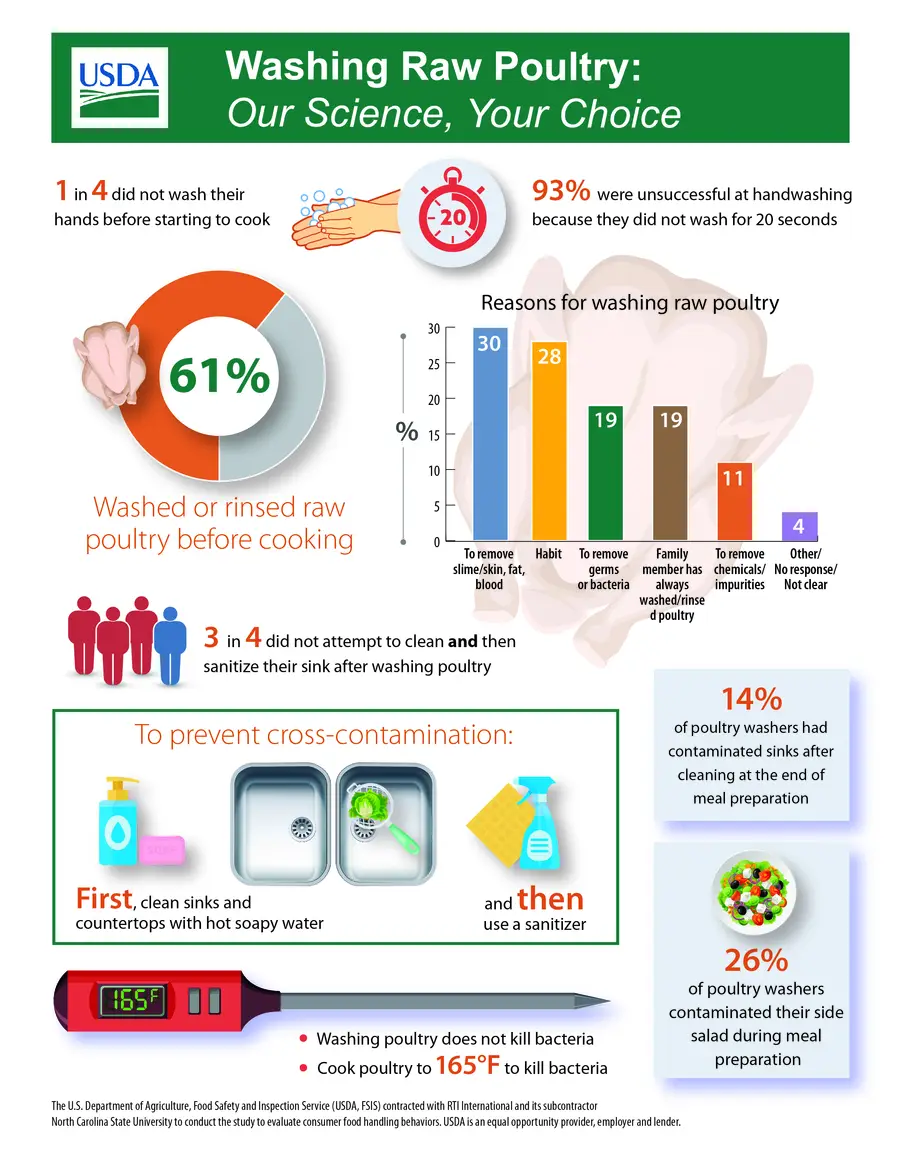Conducting meal preparation experiments to evaluate food safety interventions
Objective:
To educate consumers about food safety issues.
Approach:
We have studied a different cooking practice each year of the project using randomized, controlled studies in which consumers prepare food in test kitchens.
Impact:
Our results have reached a wide audience through official news releases and media channels, informing consumers about how they can protect their own health.
Americans often take the safety of our food for granted, but everything we eat, whether store-bought or made from scratch, is subject to risk if not properly handled and prepared. Often, our own cooking techniques put us at risk without our even realizing it.
RTI is helping educate consumers about these fundamental food safety issues. As part of a five-year project with the U.S. Department of Agriculture’s Food Safety and Inspection Service, or FSIS, we have conducted randomized, controlled studies examining different cooking practices each year. Each study investigates how typical consumers prepare food and whether their techniques are as safe as they should be.
Working with our partners at North Carolina State University (NCSU), under the direction of Dr. Ben Chapman, we have watched hundreds of consumers prepare food in test kitchens. The results have been eye-opening.
Consumers Make a Lot of Food Safety Mistakes, Putting Their Families at Risk for Illness
“We observe a lot of consumers doing things wrong,” said Sheryl Cates, an RTI food safety researcher. “In surveys, they say they’re doing it right, but you observe them and, for example, although they’ll say they’re washing their hands properly, they’re really just rinsing them.”
Year one of the project focused on the use of food thermometers. We asked participants to prepare turkey burgers in NCSU test kitchens. Half of the participants watched a USDA video about food thermometer use first.
We found that those who viewed the video were twice as likely to use a thermometer, and twice as likely to place it in the burger correctly, as those who didn’t view the video. They were also more likely to cook the burgers to at least 165°F, the recommended internal temperature.
Across all participants, however, risky food safety behaviors were rampant. The consumers in our study failed to properly clean their hands 97 percent of the time, and nearly half of them transferred bacteria to the spice containers they were using. More information about the study is available in this report prepared for USDA.
In year two, we studied whether people wash poultry before cooking it. Many consumers follow this routine, but it’s not recommended because it does not remove bacteria and can spread bacteria to sinks or nearby food.

Before the experiment, we sent half of the participants messages and videos about not washing poultry and avoiding cross-contamination. In the test kitchens, participants cooked chicken thighs and prepared a salad, allowing us to measure whether they introduced bacteria to the salad. Again, consumers made a lot of food safety mistakes during meal preparation. Nearly 60 percent of the participants who washed their poultry had bacteria in their sink afterward. And similar to year 1, participants were not very effective at washing their hands or sanitizing kitchen surfaces. More information about the study is available in this report.
In each year of this project, as we have explored a different type of food or cooking practice, overarching themes have emerged. Most notably, we have learned that consumers need better education on simple, accessible food safety practices that could help protect them and their families from foodborne illness.
This year, we are shifting away from fresh meat and poultry, studying how consumers prepare frozen chicken entrees. We are also working on designing the studies for years four and five.
Improving Consumer Food Safety Practices
As experts in both the practice and the impact of food safety, our goal is to work with our clients to inform outreach efforts that help Americans adopt safer food preparation techniques. FSIS disseminated the findings of the food thermometer and poultry washing studies which were picked up by popular media outlets, reaching a wide audience. The more we know about consumer behavior regarding food safety, the more we can spread the word about these important practices that can keep American consumers and their families aware and healthy.
This research was funded by the U.S. Department of Agriculture, Food Safety and Inspection Service. The findings and conclusions in this publication have not been formally disseminated by the U.S. Department of Agriculture and should not be constructed to represent any Agency determination or policy.- U.S. Department of Agriculture
- Food Safety and Inspection Service
- North Carolina State University


